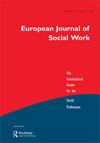瑞典一项关于工作人员在怀疑失智症患者的非正式照护者实施家庭暴力时如何推理和采取行动的研究
IF 1.6
3区 社会学
Q2 SOCIAL WORK
引用次数: 0
摘要
老年痴呆症患者面临家庭虐待的几个风险因素,例如依赖他人管理日常生活。本研究的目的是探讨工作人员在怀疑痴呆症患者的非正式照顾者实施家庭虐待时的行为和推理。研究人员对生活在普通家中的痴呆症患者的工作人员(n = 39)进行了8次半结构化的小组访谈。主题分析产生了两个主题;缺少地图指导,只能靠自己的内心指南针指引方向,这表明员工在怀疑虐待时缺乏指导方针和协议。这导致工作人员在怀疑家庭暴力时根据自己的规范、价值观和经验采取行动。不知道如何行动可能会导致工作人员最终无所作为或无法确定有效的干预措施,并伴有内疚感和道德压力。研究结果强调,有必要为工作人员提供工具,指导他们在怀疑家庭暴力时如何采取行动,例如与他人、同事和其他组织合作,在这些组织中可以出现不同的干预方案。本文章由计算机程序翻译,如有差异,请以英文原文为准。
A Swedish study about how staff reason and act when they suspect domestic abuse perpetrated by informal caregivers of persons with dementia
Older persons with dementia have several risk factors for being exposed to domestic abuse, for example dependency on others to manage daily life. The purpose of the study was to explore how staff act and reason when suspecting domestic abuse perpetrated by informal caregivers of persons with dementia. Eight semi-structured group interviews were conducted with staff (n = 39) working with persons with dementia living in their ordinary homes. A thematic analysis generated two themes; Missing a map for guidance and Being left to one’s own inner compass for direction indicating that staff experienced a lack of guidelines and protocols to work from when suspecting abuse. This resulted in staff taking actions based on their own norms, values, and experiences when suspecting domestic abuse. Not knowing how to act risks leading to staff ending up doing nothing or being unable to identify effective interventions, accompanied by feelings of guilt and ethical stress. The results highlight the necessity of providing staff with tools for how to act when they suspect domestic abuse, such as collaboration with others, colleagues, and other organisations where different options for interventions can emerge.
求助全文
通过发布文献求助,成功后即可免费获取论文全文。
去求助
来源期刊

European Journal of Social Work
SOCIAL WORK-
CiteScore
3.50
自引率
20.00%
发文量
96
期刊介绍:
The European Journal of Social Work provides a forum for the social professions in all parts of Europe and beyond. It analyses and promotes European and international developments in social work, social policy, social service institutions, and strategies for social change by publishing refereed papers on contemporary key issues. Contributions include theoretical debates, empirical studies, research notes, country perspectives, and reviews. It maintains an interdisciplinary perspective which recognises positively the diversity of cultural and conceptual traditions in which the social professions of Europe are grounded. In particular it examines emerging European paradigms in methodology and comparative analysis.
 求助内容:
求助内容: 应助结果提醒方式:
应助结果提醒方式:


